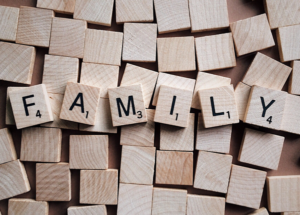
Family is a popular topic at Russian language learning any stage. Whether you are talking about yourself, discussing parenting issues or planning a visit to a new acquaintance, the basic words and expressions about family and family relationships are sure to come in handy. Today, we tell you how to talk about family in Russian and explain some grammatical subtleties.
Let’s start with the simple – who is the family part and how to properly name family members in Russian. Family ties are usually taken seriously in Russia, and this is most evident during major holidays, when one tries to invite all relatives, both close and distant.
So, nearest relatives:
By clicking "Send" you agree to us processing your information
The relatives above names all are usually used in formal or neutral speech. If you are communicating informally, addressing your relatives, then variants are more appropriate:

Мама is the first word that many children say. – Mom is the first word that many children pronounce.
Мамочка, я тебя очень люблю! — Mommy, I love you very much!
When a woman and a man marry, they automatically acquire other relatives. Sometimes one of the spouses may already have children by this time, they also become relatives to the other spouse. There are also names for these family members each. For example, золовка (husband’s sister), свояченица (wife’s sister) and невестка (жена брата) in English will sound the same sister-in-law. In Russian, each relative and daughter-in-law is called differently. It is the same with other non-blood relatives:
Моя теща — удивительный человек! — My mother-in-law is an amazing person!
Моя невестка недолюбливает меня. — My sister-in-law doesn’t like me.
To introduce your family members, use a simple design:
The second option is to use the possession construct:
To talk about family, remember possessive pronouns and the nouns genitive. The possessive pronoun must match the noun gender with which it is used: мой папа, твоя мама, наши родители.
You need the genitive case in Russian to talk about kinship: жена (whom?) брата, сестра (whom?) мужа, родители (whom?) Анны и Петра.
In addition, a few more words and expressions that will help you talk about family in Russian:
This is what your story about your family might look like:
У меня большая семья. У меня есть родители, три сестры, два брата, много племянников и двоюродных братьев и сестер. Мои сестры замужем, а братья холостые. Мои родители — уже бабушка и дедушка, у них есть внуки. У нас дружная семья и хорошие отношения. / I have a large family. I have parents, three sisters, two brothers, many nephews and cousins. My sisters are married and my brothers are single. My parents are already grandparents, they have grandchildren. We have a friendly family and a good relationship.
To memorise all your relatives’ names in Russian more quickly, draw your family genealogical tree and sign the family members. A clear example will help you to understand the subject more quickly.
We hope you found this article useful. We are ready to help you learn Russian online with a native speaker. Classes are individually adapted to your wishes. Submit an application for a free trial lesson and we will find the most suitable Russian language course for you.

By clicking "Send", you consent to us processing of your information.





By clicking "Send" you agree to us processing your information
By clicking "Send" you agree to us processing your information